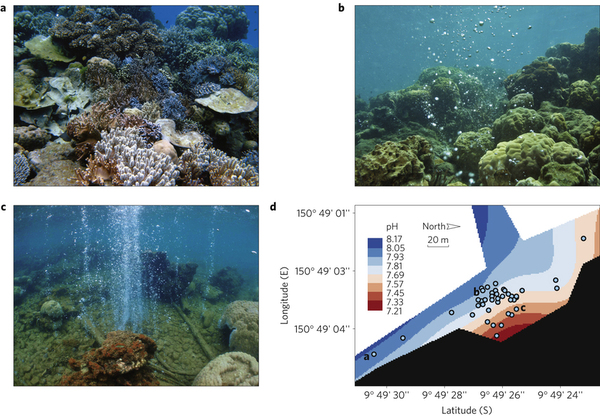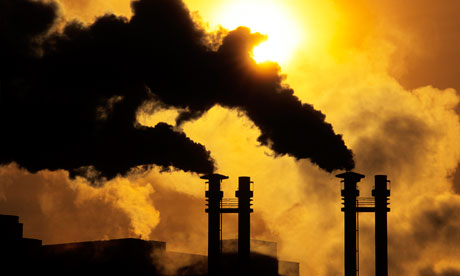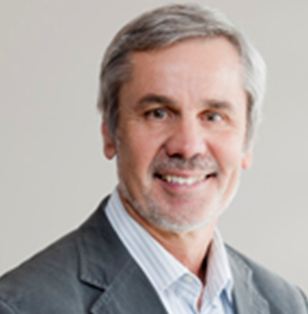Dobu Island in Papua New Guinea has active underwater fumaroles (Jennifer Marohasy posted on it a few years back) that seep high concentrations of CO2 into the environment, in turn acidifying the surrounding ocean. These vents have been active for at least 50 years: according to village elders these seeps have existed at that location throughout their life (the local traditional site name “Illi Illi Bua Bua” translates to “Blowing Bubbles”).
Katherina Fabricius and a collaboration of scientists have published an amazing article in the journal Nature Climate Change looking at a gradient across these seeps and the impacts on coral reef ecosystems. The results are striking:

Seascapes at a, control site (‘low pCO2’: pH~8.1), b, moderate seeps (‘high pCO2’: pH 7.8–8.0), and c, the most intense vents (pH<7.7), showing progressive loss of diversity and structural complexity with increasing pCO2. d, Map of the main seep site along the western shore of Upa-Upasina (marked as grey; map: Supplementary Fig. S1). Colour contours indicate seawater pH, and the letters indicate the approximate locations of seascapes as shown in a–c.
“The implications of the observed ecological changes for the future of coral reefs are severe. The decline in structurally complex framework-forming corals at lowered pH is likely to reduce habitat availability and quality for juvenile fish and many invertebrates. The low coral juvenile densities (including those of Porites) probably slows coral recovery after disturbance, suggesting reduced community resilience. The loss of crustose coralline algae that serve as settlement substratum for coral larvae probably impedes larval recruitment, and the doubling of non-calcareous macroalgae reduces the available space for larvae to settle. Susceptibility to storm breakage would also increase, if internal macrobioeroder densities in massive Porites are indicative of borer densities in other coral taxa and reef substrata.”
Bearing in mind these caveats, our data nevertheless suggest that tropical coral reefs with high coral cover can still exist at seawater pH of 7.8 (750 ppm pCO2), albeit with severe losses in biodiversity, structural complexity and resilience. As pH declines from 8.1 to 7.8 units, the loss of the stenotopic fast-growing structurally complex corals progressively shifts reef communities to those dominated by slow-growing, long-lived and structurally simple eurytopic massive Porites (Fig. 1a,b).
Reef development ceases at 7.7 pH units (980 ppm pCO2), suggesting these values are terminal thresholds for any form of coral reef development. T
The big question that remains is how elevated sea temperatures will interact with the effects of acidification. So far, it doesn’t look hopeful (Anthony et al. 2008). More from the BBC and Sciencedaily. Unsurprisingly, no word from Andrew Bolt, Anthony Watts or Jennifer Marohasy.



 Economic recession has failed to curb rising emissions, undermining hope of keeping global warming to safe levels Photograph: Dave Reede/All Canada Photos/Corbis
Economic recession has failed to curb rising emissions, undermining hope of keeping global warming to safe levels Photograph: Dave Reede/All Canada Photos/Corbis
 After all the misinformation bad reporting from The Australian (
After all the misinformation bad reporting from The Australian (


 Seems that the money is running away from Channel 10’s newest show, The Bolt Report … wonder why?
Seems that the money is running away from Channel 10’s newest show, The Bolt Report … wonder why?